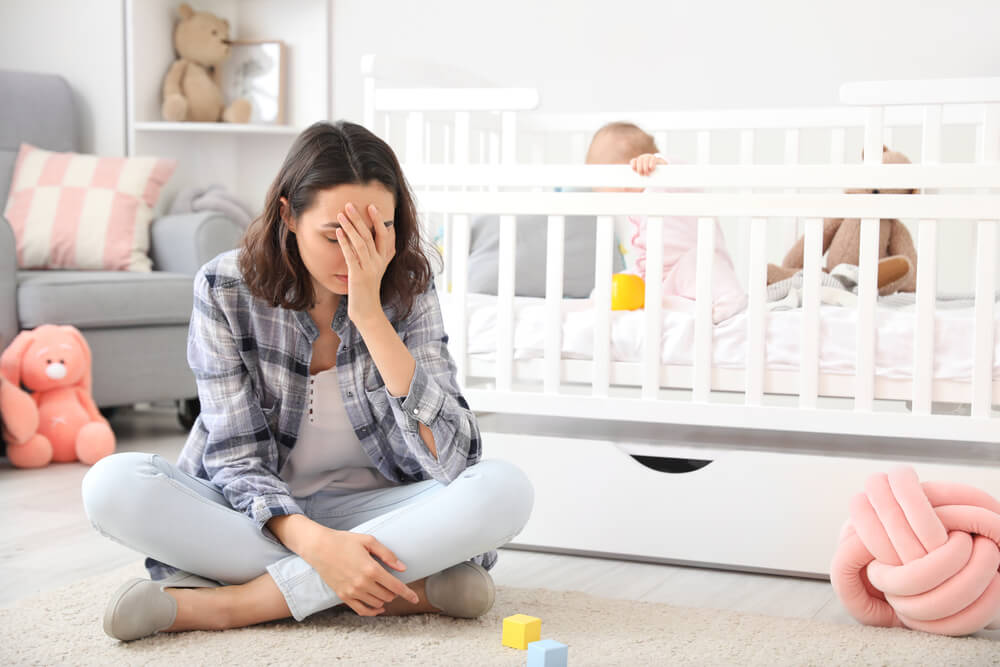Pregnancy and motherhood are adventures with both ups and downs. Many new moms are subjected to the baby blues after giving birth, making them feel anxious and depressed. Hormone changes, financial worries, and the stress of a hospital visit can all add to the weight of these baby blues. Thankfully, they typically only last for a few days after giving birth.
But are you wondering what if my wife has postpartum depression? This condition can last for as long as a year after giving birth. It is a serious condition, and the depressed mother should not be taken lightly. We’ve put together some tips on how to help your wife with postpartum depression .
Depression and Motherhood: What Is Postpartum Depression?
Postpartum depression is a form of major depression which usually occurs in the first few weeks of giving birth but can occur anytime in the following year or even during the pregnancy. If left untreated, it can affect your parenting and lead to a more serious depressive condition. It can also negatively impact the child as they mature.
The condition is thought to be caused by chemical factors, as hormones increase greatly during pregnancy then drop to normal levels after delivery. Stress, social changes, and the psychological strain of being a new mother can also lead to depressed moms gaining postpartum depression.
Most people know that postpartum depression can cause sadness, anxiety, feelings of hopelessness and guilt, and anger in new moms. Less known is that it can cause trouble sleeping and eating, concentration issues, and difficulty keeping bonds with both friends and the new baby. More seriously, it can lead to thoughts of harming herself or the new baby. If you are worried about these complications while researching how can I help my wife with postpartum depression, make sure to contact us with questions about depression and motherhood .
Dealing With Postpartum Anxiety

When people ask how to help a wife with postpartum depression, the first step is emotional support. Listen to her feelings. Don’t compare her emotions to other mothers or try to offer guaranteed solutions to her problems. She needs supportive figures which will allow her to vent and cry, listen to her without judgment, and reassure her that everything will be okay. Did you know that one symptom of postpartum depression is excessive crying? Understand that for a depressed mother, these tears can relieve stress.
Depressed moms often feel like they are not good mothers. This can lead to feelings of guilt and anxiety. Motherhood is one of the hardest jobs in the world, so make sure to reassure her that she is doing enough. Tell her that she will be a wonderful mother. Raising a child is difficult, but remind her of all the preparation you’ve done to ensure your child will grow up safe and happy. Try not to criticize her emotions.
Be aware that postpartum depression can cause panic attacks. Plan in advance for this event to be confident in your ability to support her during the bad days.
Postpartum Depression Isn’t a Permanent Condition
No words can cure a depressed mother ’s bad feelings. When all else fails, make sure she understands that this pain is temporary. She will not feel like this forever. These emotions will only last for a small fraction of the time you will spend raising the child, and before long, the sadness will subside, and she’ll start to have more good days than bad.
If the depression doesn’t subside, a doctor may be able to prescribe medication for depression. You shouldn’t let her lose hope of returning to normal.
How Can I Help My Wife With Postpartum Depression?
Offer Active Support
Many fathers will say, “ My wife has postpartum depression,” but they don’t take action to help her beyond words of support. You can’t be a passive figure in her life. Is she struggling to focus on which tasks need to be done, such as preparing new diapers or cooking dinner? Step in and start helping before she needs to ask for help. Take the initiative to care for your child and perform daily chores. Her concentration issues will make it difficult for her to make concrete plans, so you need to offer your strength and guidance.
This is especially important because dealing with postpartum anxiety leads to fatigue and insomnia, on top of the exhaustion from caring for the baby during the night. Try to help her sleep while the baby sleeps, and do your best to care for the child while the mother sleeps. You should treat her resting times as one of the most valuable resources in the home. If she seems tired even after sleeping, don’t judge her as lazy. Some women will struggle with extreme fatigue no matter how much they rest.
Whatever you do, don’t promise to follow through on something, then not do it. Her depression may cause her to feel hopeless about your parenting skills, so you must show her that you are reliable even during the toughest days.
Help Her to Connect With Friends and Family
Do you want to plan how to help your wife with postpartum depression? Luckily, you don’t have to help her alone. Friends and family can offer her support too. During the first few days after
returning home, limit visitors. She will be stressed and tired, and it’s important for alone time to bond with the baby.
Afterward, you can start to invite over friends and family. Depressed moms can have difficulty keeping up relationships, so step in and be proactive in setting up visits. The new grandparents are typically dying to see the baby and will be overjoyed to help out at home. If you and your wife are comfortable with it, they can even babysit. This gives you both some valuable alone time to support each other and revitalize your intimate bond.
If your wife is too stressed to have people over, consider setting up remote communications. You can call friends over the phone or use an online service to video chat for free. This way, you both are under no obligation to care for guests while thinking about your baby. It is also quieter if you don’t want to take the risk of someone waking a sleeping newborn.
It is also worthwhile to consider support groups or counseling. Both of these are wonderful resources for any mother, whether it is her first child or fifth.
Help Her to Exercise

The new mother may have aches and pains. She may be too tired to leave the bed when not caring for the newborn. But if possible, help to exercise as much as her doctor permits. This doesn’t have to be a dedicated run. She can simply walk around the house or do light stretches in the morning.
Exercise can help with stress and insomnia. It can even help to prevent postpartum depression entirely if done early on. Some professionals recommend beginning exercise a few days after giving birth, as long as a doctor has not recommended additional rest.
Are You Feeling Confident Knowing How to Help Your Wife With Postpartum Depression?
Pregnancy is tough for both parents, so there’s no shame in not knowing how to best help your wife. But as you can see, the best actions are to offer emotional support, be proactive, and help her gain support from friends and family. Do you feel any more ready for the possibility of postpartum depression?
Whether you’re more confident or still nervous, feel free to schedule an appointment with us. We offer care before, during, and after the pregnancy. We offer support, not judgment, to parents dealing with postpartum depression and would love to share this support with you.




